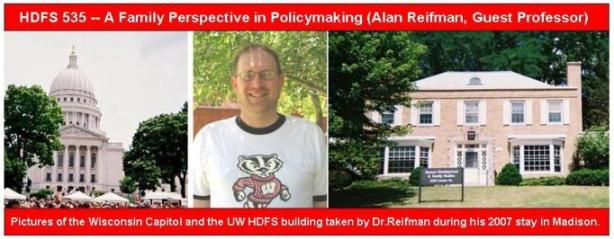Today we'll be covering the law of divorce. One of the key issues -- if not the key issue -- is the evolution from the 1960s through the 1980s from a fault-based divorce system to a no-fault one. Some observers argue that we've gone from a system where divorce was too difficult to obtain, to one where it's too easy to obtain. However, attempts to come up with new policies, such as covenant marriage, have not proven very popular.
Family policy students often have interesting ideas for possible new ways to handle divorce. I look forward to hearing them in class or in the online comments!
SOME TUESDAY NIGHT UPDATES ON ISSUES THAT WERE RAISED IN TODAY'S CLASS
Similar to Erin's idea about requiring marital counseling during the divorce waiting period to ensure that the waiting time is actually used to try to repair the relationship, here's a proposal I found on the web.
Another topic of discussion was whether courts could restrict the behavior of parties going through a divorce during any waiting periods that may exist. I found two potentially relevant documents in this area. The first document, from a Wisconsin county's family court, talks about automatic restrictions on conduct such as harassment, and concealing and destroying property. These seem to be consistent with common sense. The second document, from a divorce attorneys' organization, goes over which states have waiting periods to remarry after a divorce (and if so, how long). Relatively few states have remarriage waiting periods.
Lastly, a question came up about whether states that have longer waiting periods have lower divorce rates (perhaps because some couples may reconcile during the waiting period or a waiting period could be a deterrent to divorce). Also as I said in class, lacking a tightly controlled experiment, any correlation (potentially) obtained between states' having long waiting periods and low divorce rates would be open to different possible interpretations. Perhaps waiting periods do affect divorce rates. However, it could be that citizens' highly valuing marriage (which could help keep divorce rates low) could also lead to the legislature passing laws implementing waiting periods (as an aside, I also maintain a blog on correlation and causality). Anyway, the following article (available via the UW-Madison library website) presents a pretty rigorous examination of factors that might lead to divorce.
Sweezy, K. & Tiefenthaler, J. (1996). Do state-level variables affect divorce rates? Review of Social Economy, 44, 47-65.
These authors' conclusion: "Both the state waiting period and the type of state property distribution laws are insignificant in determining the probability of divorce" (p. 63).
Subscribe to:
Post Comments (Atom)


4 comments:
Some of the comments made today in class about different requirements for waiting periods were very good ideas. I think we do need to find a way as a society to calm down divorce rates and to re-introduce the importance of working on a marriage instead of just giving up. We also need to be sure that the government is not over stepping their boundaries at the same time by being too involved in people’s marriages.
I find it very interesting that the research done found no significance between divorce rates and the waiting periods. I also agree that as a society we need to work on marriages instead of giving up, but it seems that making longer waiting periods for divorce would not make a difference. In some instances a longer period could make the situation even worse.
I agree with Kristine on how society needs to work on marriages instead of giving up when the going gets tough. I was wondering how much it costs (or range from)for a couple to get counseling? Does society pay for some of it especially if the waiting period in some states for divorce is so long?
I think it's refreshing to hear the comments reflecting the attitude that marraiges take work. I read an article for the Couple Relations HDFS course last semester, where many people were expressing the "if it doesn't work out as I have imagined, then we'll just get divorced" attitude. It's sad to me when people have that attitude. I think part of it is what people picture in their heads, and expecting THEIR plans and ideas of marriage to work out. Then when it's not picture perfect, they get divorced. I guess I just don't see the point in getting married if the commitment isn't actually even there in the first place, and you feel the freedom to leave after encountering a few rough patches. When you say your vows, you promise that you'll stick it though...not, "I'll be there for better, but not worse."
Post a Comment